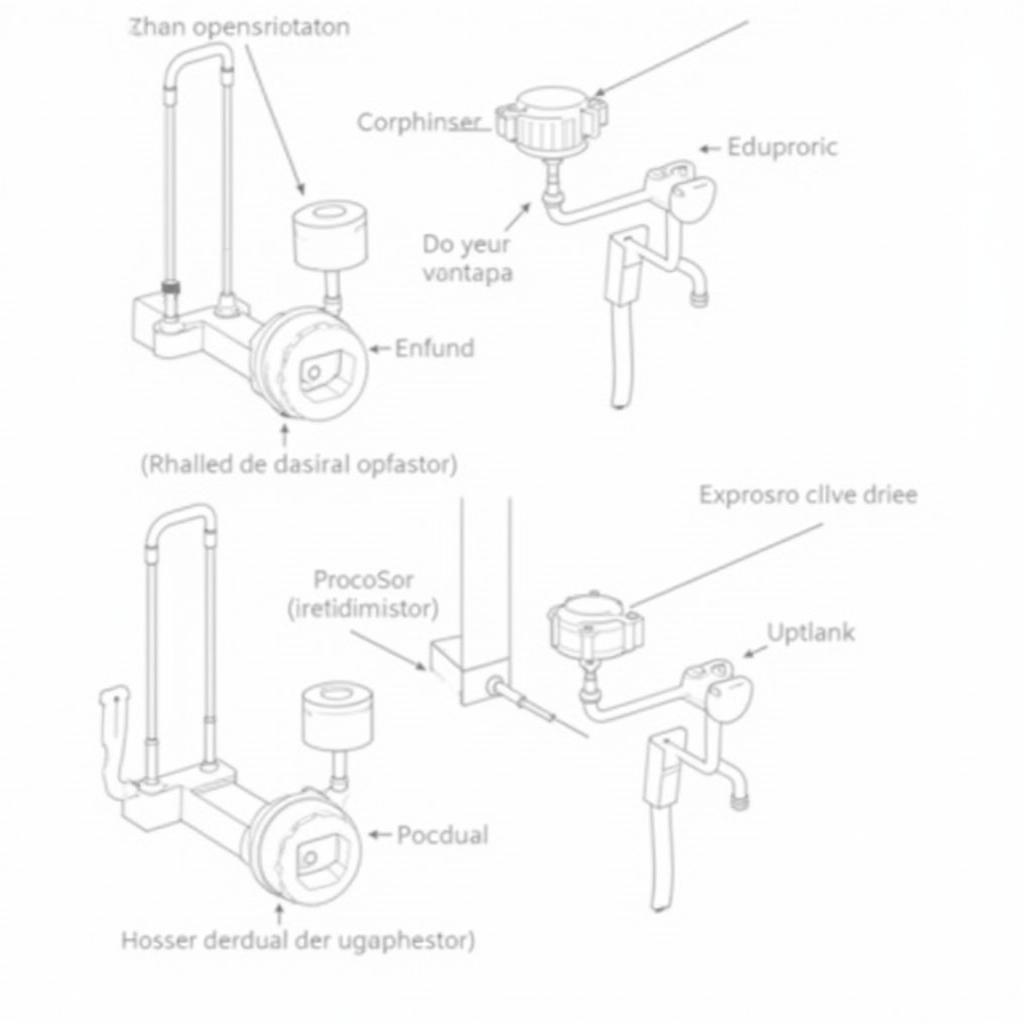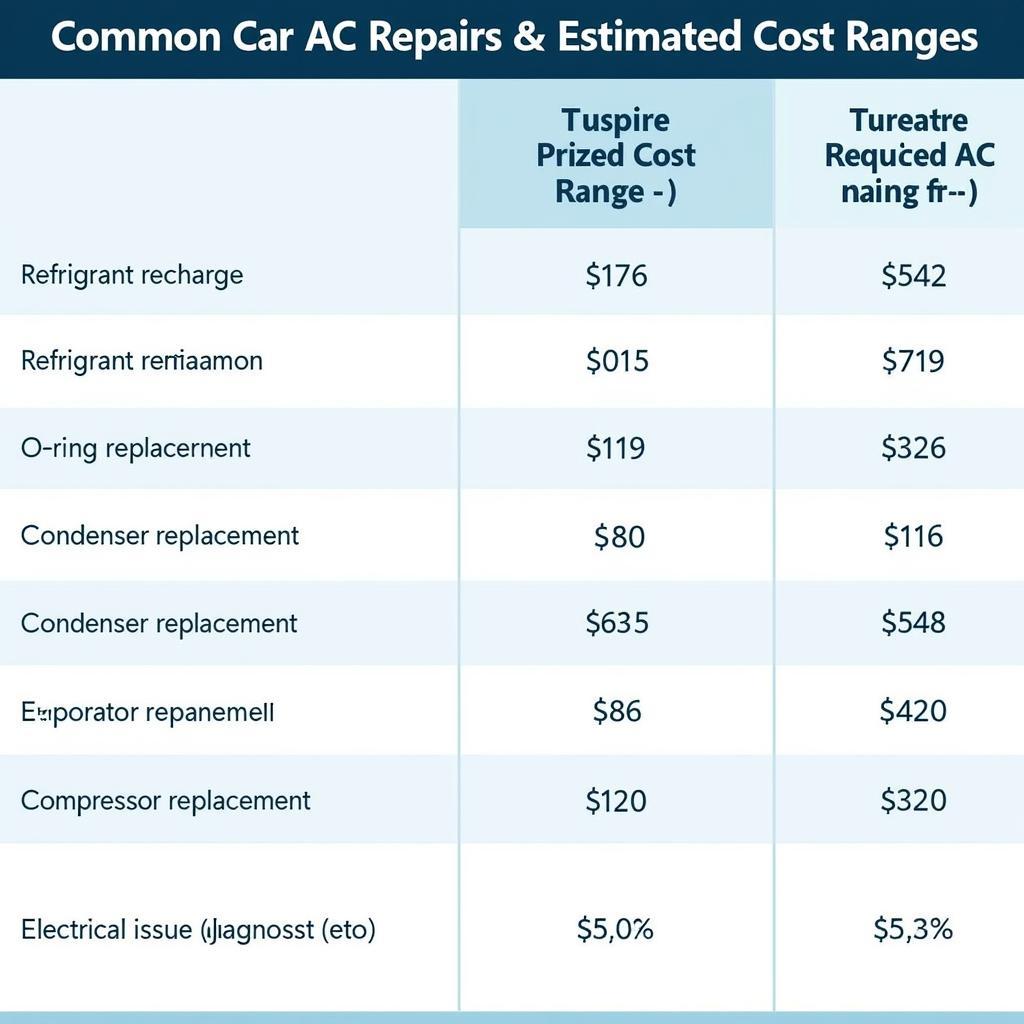Picture this: It’s a sweltering summer day, and you’re stuck in traffic. You crank up your car’s AC, but instead of a blast of cool air, you’re met with a disappointing puff of lukewarm air. Not only is a broken AC uncomfortable, it can also significantly decrease your car’s resale value. But before you start panicking about the cost of repairs, let’s break down the factors that influence AC repair costs and give you a better understanding of what to expect.
Understanding Your Car’s AC System
Your car’s AC system is more complex than you might think. It’s a network of components working together to transform hot air into a cool breeze. This intricate system includes:
- Compressor: The heart of the system, the compressor pressurizes and circulates the refrigerant.
- Condenser: Situated in front of the radiator, the condenser cools the refrigerant by releasing heat.
- Evaporator: Located inside the dashboard, the evaporator absorbs heat from the cabin air, thus cooling it down.
- Receiver/Dryer: This component removes moisture from the refrigerant and stores excess refrigerant.
- Expansion Valve/Orifice Tube: This regulates the flow of refrigerant into the evaporator.
- Hoses and Lines: These connect all the components and carry the refrigerant throughout the system.
A problem with any of these parts can lead to AC failure, and the repair costs will vary depending on the component that needs attention.
 Car AC System Components Diagram
Car AC System Components Diagram
Common Car AC Problems and Their Costs
Before we delve into specific costs, let’s explore some common culprits behind car AC problems:
- Refrigerant Leak: One of the most common issues, a refrigerant leak can occur due to worn-out seals, hoses, or components.
- Compressor Failure: The compressor is a complex part and its failure can be a significant expense.
- Electrical Issues: Problems with wiring, fuses, relays, or the AC control module can also disrupt the AC’s functionality.
- Condenser Problems: Damage to the condenser from debris or corrosion can affect its cooling efficiency.
- Evaporator Issues: A clogged or leaking evaporator can restrict airflow and impact cooling.
Now, let’s address the question that brought you here: How much does it cost to fix a car’s AC?
Unfortunately, there’s no one-size-fits-all answer. Costs can range from a relatively affordable $50 for a simple recharge to over $1000 for major repairs like a compressor replacement.
Here’s a general breakdown of estimated costs for common AC repairs:
- Refrigerant Recharge: $50 – $250
- O-ring or Seal Replacement: $100 – $300
- Condenser Replacement: $200 – $800
- Evaporator Replacement: $500 – $1500
- Compressor Replacement: $600 – $1500+
- Electrical Issue Diagnosis and Repair: $100 – $500+
 Chart of Average Car AC Repair Costs
Chart of Average Car AC Repair Costs
Factors Influencing Repair Costs
Several factors can influence the final cost of your car AC repair, including:
- Make and Model of Your Car: Luxury or rare vehicles often have more expensive parts.
- Labor Costs: Labor rates vary depending on your location and the mechanic’s expertise.
- Severity of the Issue: A simple leak repair is less expensive than a complete compressor replacement.
- Choice of Repair Shop: Dealerships tend to charge more than independent mechanics.
Tips to Save Money on Car AC Repairs
While some AC repairs are unavoidable, here are some tips to potentially minimize costs:
- Regular Maintenance: Schedule routine AC checks and refrigerant top-ups to prevent major issues.
- Shop Around: Get quotes from multiple mechanics before deciding on a repair shop.
- Consider Used Parts: For certain repairs, ask your mechanic if using quality used parts is a viable option.
- DIY for Simple Fixes: If you’re mechanically inclined, consider tackling minor repairs yourself.
When to Seek Professional Help
While some minor AC issues might be manageable with DIY solutions, it’s crucial to recognize when professional help is necessary. If you’re experiencing any of the following, don’t hesitate to contact a qualified mechanic:
- No Cold Air at All: This could indicate a major issue like a compressor failure or a significant refrigerant leak.
- Unusual Noises: Clicking, grinding, or squealing sounds coming from the AC system require immediate attention.
- Foul Odor: A musty smell could signal mold growth in the evaporator.
- Dashboard Warning Lights: Any warning lights related to your car’s AC system should not be ignored.
Remember, attempting complex AC repairs yourself without proper knowledge and tools can potentially worsen the problem and lead to higher repair costs in the long run.
Preventative Measures for a Long-Lasting AC System
Just like any other part of your car, your AC system benefits from regular care and maintenance. Here are some proactive steps you can take to keep your AC running smoothly and potentially avoid costly repairs:
- Regular AC Checks: Get your car’s AC system inspected annually, preferably before the start of the summer season.
- Refrigerant Top-Ups: Refrigerant levels naturally deplete over time. Regular top-ups can prevent leaks and maintain optimal cooling.
- Cabin Air Filter Replacement: Change your cabin air filter every 12,000 miles or as recommended in your car’s owner’s manual. A clogged filter restricts airflow and can strain the AC system.
- Run the AC Regularly: Even during cooler months, run your AC system for a few minutes every couple of weeks. This helps keep the refrigerant circulating and prevents seals from drying out.
- Clean the Condenser: Periodically inspect and clean the condenser of debris like leaves, bugs, and dirt.
By following these preventive measures and addressing any minor issues promptly, you can prolong the life of your car’s AC system and enjoy those cool, comfortable rides for years to come.
Conclusion
Dealing with a broken car AC can be frustrating, but understanding the potential costs and taking proactive steps to address issues early on can save you both money and discomfort in the long run.
how much to fix a car ac leak can vary greatly depending on the problem, so getting a proper diagnosis from a trusted mechanic is essential. Remember, regular maintenance is key to a well-functioning AC system.
If you’re experiencing car AC troubles and are looking for expert advice, don’t hesitate to contact AutoTipPro at +1 (641) 206-8880. Our team of experienced technicians is here to help you stay cool on the road. You can also visit our office located at 500 N St Mary’s St, San Antonio, TX 78205, United States.
FAQs
1. How often should I recharge my car’s AC?
While there’s no set schedule, it’s generally recommended to have your AC system checked for refrigerant levels every 2-3 years.
2. Can I add refrigerant to my car’s AC myself?
While DIY refrigerant recharge kits are available, it’s best left to professionals. Incorrect handling of refrigerant can be dangerous and environmentally harmful.
3. Why is my car AC blowing hot air on one side?
This could be due to a blend door actuator malfunction. The blend door controls the mix of hot and cold air, and a faulty actuator can prevent it from functioning properly.
4. How long does it take to replace a car AC compressor?
Compressor replacement is a labor-intensive repair and can take anywhere from 4 to 8 hours depending on the car’s make and model.
5. Is it worth fixing my car AC if it’s old?
The decision to repair or replace an old AC system depends on the severity of the issue and the overall condition of your vehicle. Consult with a trusted mechanic to assess the best course of action.






Leave a Reply